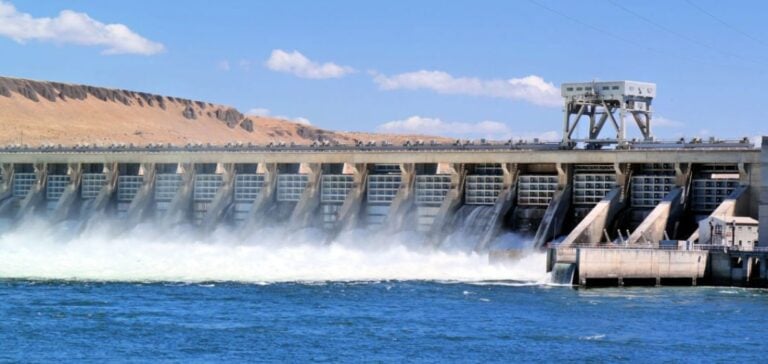Ethiopia embarked on the construction of the Grand Ethiopian Renaissance Dam (GERD) in 2011, a strategic project to address its energy needs and foster economic development. With a projected capacity of 74 billion cubic meters and an estimated annual electricity production of 16,000 GWh, this dam is the largest in Africa.
For a country where only 45% of the population has access to electricity, the GERD is a crucial solution. By doubling its energy capacity, Ethiopia hopes not only to improve living conditions but also to become a key energy exporter in the region.
However, the GERD’s implications extend beyond Ethiopia’s borders. Its hydrological impacts concern the entire Nile Basin, a vital resource for eleven African countries, including Egypt and Sudan, which fear significant disruptions.
Concerns of Downstream Countries
Egypt, which relies on the Nile for 97% of its water resources, sees the GERD as a potential threat. Concerns center around the reservoir filling periods and the impacts during prolonged droughts. The Aswan Dam, which regulates Egypt’s water resources, could face critical level reductions, jeopardizing the country’s food and energy security.
Sudan shares both risks and opportunities. On one hand, the GERD could regulate the flow of the Blue Nile, reducing flood risks. On the other hand, unilateral management of the Ethiopian dam could cause water imbalances, affecting agricultural projects and domestic needs.
Technical and Political Challenges
Despite a decade of negotiations, no legally binding agreement has been reached between Ethiopia, Egypt, and Sudan. Two major points of disagreement persist:
1. The definition of prolonged drought: Egypt considers an annual average flow below 39 billion cubic meters as a drought, while Ethiopia proposes a lower threshold of 35 billion cubic meters.
2. Mitigation policies: The countries diverge on GERD operating levels during droughts. Egypt demands lowering it to 595 meters to protect the Aswan Dam, whereas Ethiopia fears this measure would limit its energy production.
Collaborative Solutions to Avoid Crisis
Experts recommend a concerted management approach based on principles of equitable sharing and increased transparency. A recent study proposes viable scenarios to minimize tensions:
– Temporarily lowering GERD’s operating level: During prolonged droughts, reducing the level to 595 meters could minimize downstream water deficits while maintaining 87% of optimal energy production.
– Establishing a critical threshold for the Aswan Dam: Setting this at 165 meters would activate concerted management mechanisms to prevent a crisis. Real-time monitoring of the Nile’s flow would strengthen decision-making responsiveness.
The Economic Impacts of Failure
A lack of cooperation around the GERD could lead to considerable economic losses. For Egypt, each missing billion cubic meters of water would result in a loss of $0.9 billion, mainly due to reduced agricultural production. This would also exacerbate unemployment and food insecurity.
Ethiopia, on the other hand, risks slowing down GERD exploitation and losing potential revenue from electricity exports. Moreover, non-collaborative management could heighten regional tensions, compromising opportunities for joint development.
Recommendations for Sustainable Cooperation
Several recommendations emerge to address these challenges:
1. Create a regional management committee: A body composed of representatives from the three countries to oversee GERD operations and coordinate responses to droughts.
2. Promote transparency: Real-time sharing of hydrological data would enhance trust and facilitate decision-making.
3. Invest in joint projects: Initiatives for water conservation and modern agricultural infrastructure could reduce environmental impacts and stabilize Nile ecosystems.
4. Adopt a legally binding framework: A clear agreement would define responsibilities and rights for each country to prevent future crises.






















